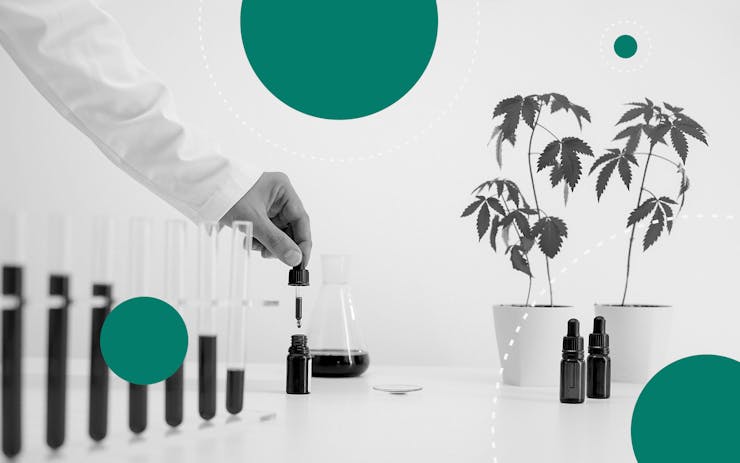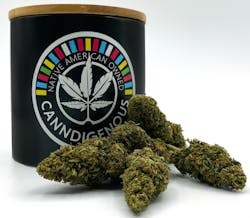When Leafly tested 47 CBD products and found that only 51% delivered the dosage promised on the label, we wanted to know why. Specifically: Why is it so hard to replicate an exact dosage in every gummy, capsule, and vape cartridge?
FDA rules on CBD are expected in early 2020. Until then, consumers are largely on their own.
“It’s a brand new industry, so a lot of hemp farmers are sowing their first crops,” said Sally Nichols, president of California-based Bloom Farms. Nichols’ company, which has years of experience in California’s state-regulated cannabis market, recently introduced its first nationwide CBD products. Bloom Farms Balance CBD Tincture landed one of our best dosage accuracy scores, testing out at 94% of its label potency.
Nichols and her company work with established organic farmers, but growers bringing in their first hemp crops can find wild fluctuations in crop quality. Hemp—defined as cannabis containing less than 0.3% THC—is the raw material from which federally legal CBD is extracted.
CBD products also exist in an unregulated industry. That means anybody can fill a capsule or tincture, seal it in a bottle, and claim it’s CBD.
FDA regulation coming soon
Alarmed by CBD’s exploding popularity and reports of adulterated products, officials with the US Food and Drug Administration (FDA) have fast-tracked the process for creating rules on CBD. But those rules aren’t expected until early 2020. Until then, consumers are largely on their own.
It may be helpful to know there are currently three CBD market categories. We ordered them according to dosage accuracy, from least accurate to most:
- CBD products derived from hemp (cannabis with less than 0.3% THC), which are no longer federally illegal. They are available nationwide, though some states still have lingering restrictions.
- CBD products that also contain more than 0.3% THC are legally sold only in state-licensed cannabis stores and medical marijuana dispensaries.
- Epidiolex, a pharmaceutical form of CBD produced by GW Pharma, which is, so far, the only dose-consistent form of CBD approved by the FDA. Epidiolex is available by prescription only and has been approved for use by patients experiencing seizures.
CBD with THC may be more accurately dosed
Many CBD products sold in legal marijuana states offer consumers more dosage accuracy because they’re subject to strict testing and labeling rules (not all states require testing, but most do). State-licensed cannabis products in California, for example, must print the exact lab-tested amount of THC and CBD on the label.
Those testing rules offer consumers assurance, and they also gives manufacturers some wiggle room when it comes to labeling. In legal cannabis markets, many products advertise their THC:CBD ratio, rather than a specific amount of CBD in milligrams. The lab-test results are then printed on each individual label, giving consumers more specific information.
Consumers looking for perfect dosage in hemp-derived CBD, the kind that’s now federally legal and available nationwide, are not likely to find it—yet. And some of that falls on consumers, who’ve told the market they aren’t willing to pay a premium for high quality, dose-consistent CBD.
“Consumers want an inexpensive introduction,” said Bloom Farms’ Nichols. “It’s a new product, and many people aren’t willing to spend a lot to try something new.” They tend to buy something cheap—which is likely to contain little or no CBD at all. And that can lead to a dissatisfying one-and-done experience.
What is ‘hemp extract’?
Another complication to consider: Some products sold nationwide may be labeled “hemp extract” with no mention of CBD on the label. That’s because federal and state rules remain fuzzy.
One of the legal cannabis industry’s most respected companies, Colorado-based Wana Brands, launched a hemp-derived CBD line called Wana Wellness in early November. Wana Brands President Nancy Whiteman told Leafly that she and her colleagues wrestled with the question of proper dosage labeling. “Because of the lack of clear FDA guidelines, we decided the correct thing right now is to refer to our first product as ‘hemp gummies,’” she said.
Wana Wellness Hemp Gummies are advertised to contain 25mg of hemp oil, of which 20mg is CBD.
Other companies may offer less specificity. The label on Charlotte’s Web Hemp Infused Balm, available nationally in Rite Aid stores, says it contains “150mg Hemp Extract.” Charlotte’s Web is produced by the Colorado company that essentially started the CBD craze years ago when it bred a high-CBD strain of cannabis and named it after Charlotte Figi, the young girl who famously calmed her seizures with CBD.
The label on that infused balm may be confusing to consumers because it pairs a vague term, “hemp extract,” with a precise measure of dosage, 150mg. Upon testing, we found Charlotte’s Web Hemp Infused Balm contained 80mg of CBD. That’s not technically mislabeled, as the manufacturer promised only 150mg of “hemp extract.” But in the real world, most consumers will read the label and assume they’re buying a 150mg CBD topical.
It’s doubly confusing when a tube of Veritas Farms Lip Balm, which promises that it contains “25mg Full Spectrum Hemp Oil,” tests out at a nearly-perfect 24mg of CBD. We purchased the Veritas lip balm right next to the CW Hemp Infused Balm at the same Rite Aid store.
Lab testers: they’ve seen it all
Pat Reynolds is the operations director at Confidence Analytics, the licensed lab in Washington State that carried out Leafly’s CBD label potency tests. Friends sometimes ask him for advice on finding consistently dosed products. “One guy recently told me, ‘I found a good one, the first time I bought it, it was great. But the next one was so strong it was crazy.’ He said it was the same brand. I told him to stop buying that brand. Find one that’s consistent,” Reynolds said.
'Find a brand that delivers a consistent dose.'
In both the state-legal cannabis market and the federal-legal hemp-derived CBD market, there’s a wide range of quality control. “We work with one company that prides itself on being within 1% of their label dosage,” Reynolds said. “They tried a new formulation, sent it to us, and it measured within 5% of their expected dosage. Now, in our experience with thousands of cannabis and CBD products, a 5% variance is great. But this company insists that their stuff be spot-on.”
Not all companies aspire to that high standard. “We see all kinds. If a product fails to meet testing standards, one company will say ‘Oh crap, we made a mistake, help us figure this out.’ We’ll work with them and give them the benefit of our experience.”
Other companies may walk away and go lab shopping until they find a result they like. “They may tell us, ‘Nope, your lab is wrong,’ and they go away and we never hear from them again,” said Reynolds.
Two companies, two measures of quality
Because there is no single set of regulations for CBD, even the best companies may differ in how they gauge and communicate the quality of their products.
Wana Wellness: Testing and transparency
Wana Wellness focuses on third-party lab testing. “Third-party labs are the core” of Wana’s quality assurance, said company president Nancy Whiteman. “With third-party testing you can be sure the dosage is exactly what we’re saying it is.”
To that end, Wana Wellness maintains a testing portal on its website. Consumers can enter a specific product batch number and Wana will link to a third-party lab’s certificate of analysis for that batch.
Bloom Farms: Organic process and products
At Bloom Farms it’s less about testing—though they do test each batch and post the results—and more about sourcing the highest quality organic ingredients. “When we started formulating our CBD line 18 months ago, we visited organic farmers,” said Bloom Farms President Sally Nichols. “We took hemp samples and extracted them. We’re not buying oil out of a catalog.”
Organic farming isn’t just about growing without using Roundup. It requires years of work to set up entire processes. It’s not easy, and it’s not cheap. USDA organic certification is specific to a farming operation, not to a specific crop alone. So while hemp may be newly legal, Bloom Farms partnered with farmers who had already been certified organic for other crops and were moving hemp into their portfolio.
“If someone’s going through the effort of sourcing USDA-certified organic ingredients,” said Nichols, “chances are the other ingredients [and elements of quality control like as dosage] are being thought through.”
Previously:
Part 1: Are you getting the CBD you paid for? We put 47 products to the test
Next:
Part 3: Seven ways to make sure you get the CBD you paid for





